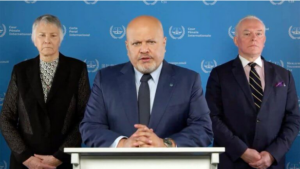Will the ICC approve arrest warrants for Israel and Hamas leaders?

Karim Khan, Chief Prosecutor of the ICC (C), announces he is seeking arrest warrants from the court’s judges for PM Benjamin Netanyahu and DM Yoav Gallant, along with Hamas leaders Yahya Sinwar, Mohammed Deif and Ismail Haniyeh, 20 May 2024
Julian Borger writes in The Guardian on 20 May 2024:
The international criminal court’s chief prosecutor, Karim Khan, has announced he will apply to the court for arrest warrants for Benjamin Netanyahu, Israel’s prime minister, as well the country’s defence minister, Yoav Gallant. At the same time, Khan is seeking warrants for the leader of Hamas, Yahya Sinwar, the head of its military wing, Mohammed al-Masri (better known as Mohammed Deif), and the head of its political bureau, Ismail Haniyeh.
The charges he is pursuing against Netanyahu and Gallant concern the conduct of the war in Gaza, include the use of “starvation of civilians as a method of warfare”, “intentionally directing attacks against a civilian population as a war crime”, extermination as a crime against humanity, and murder as a war crime.
The proposed charges against the Hamas leadership focus on the 7 October attack on southern Israel, which started the current war. They include “extermination as a crime against humanity”, “taking hostages as a war crime”, “rape and other acts of sexual violence as crimes against humanity”, and “torture as a crime against humanity”.
Will arrest warrants now be issued against Netanyahu, Sinwar and the others?
Not necessarily. The application for warrants now goes to one of the pre-trial chambers in the ICC, and will be decided on by a panel of three judges. At the moment, the chamber involved is made up of judges, from Romania, Benin and Mexico. It is not a foregone conclusion that they will approve all Khan’s requests, but legal scholars point out that the threshold of evidence for a warrant is just “reasonable grounds to believe”, rather than “beyond a reasonable doubt”, which is the standard for conviction at trial.
Iva Vukušić, an expert on international legal institutions at the Utrecht University, in the Netherlands, said: “The prosecution is not dumb; they would not mess up at this stage at such an important case everyone is looking at. So I believe the judges will agree on the warrants.”
However, a huge amount of global political pressure is likely to descend on those three judges in the days to come.
If arrest warrants are issued, what will that mean for those charged?
The ICC does not have its own police force or enforcement mechanism, but the warrants would seriously limit the travel options of the indictees. The 124 state members of the ICC would be under obligation to arrest them, and even non-members would come under pressure to carry out an arrest.
In practice, powerful non-members such as the US, Russia and China, would shrug off such pressure. Netanyahu and Gallant, for example, would still be able to visit America. Sinwar and Deif are believed to be in Gaza so beyond reach for the time being. Haniyeh is based in Qatar, which is not a member of the ICC.
Are any more warrants expected from the ICC prosecutor?
